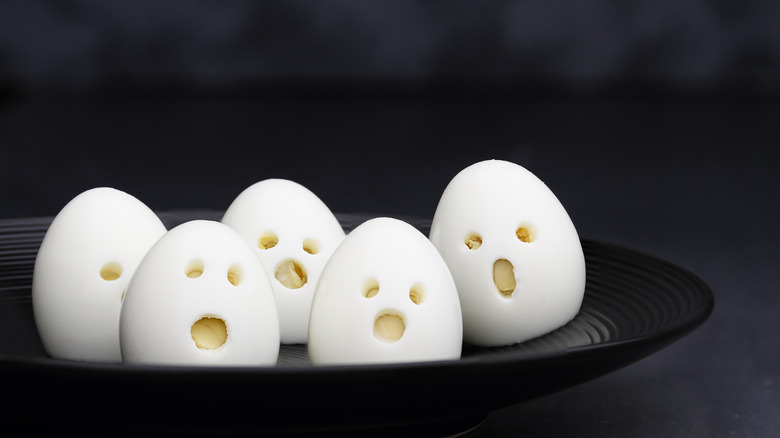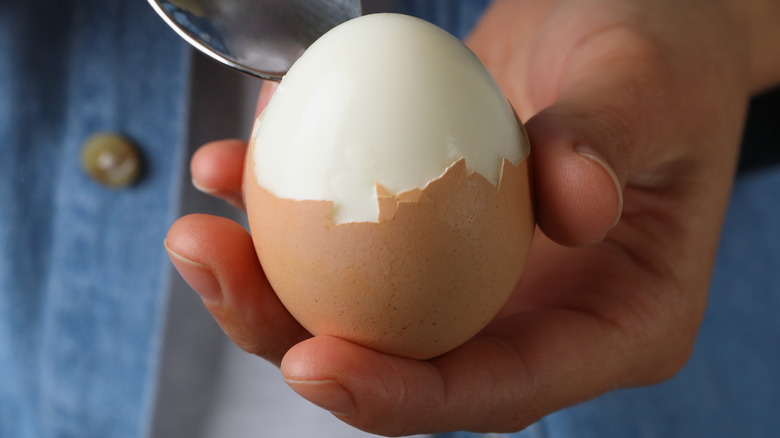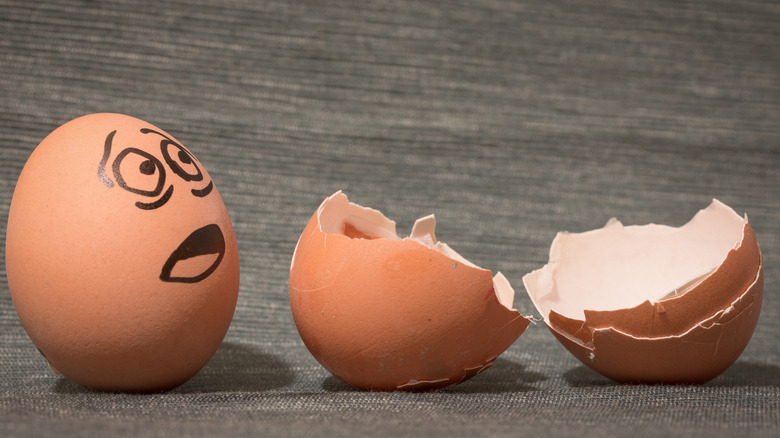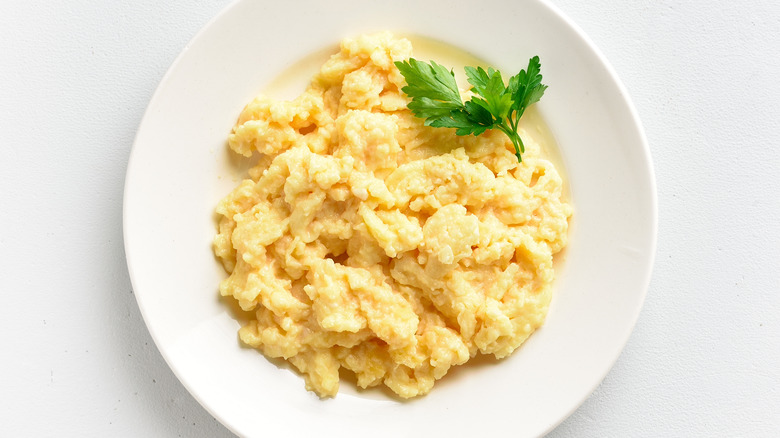The Reason You Shouldn't Boil Eggs Straight From The Fridge
If you've ever been entrusted with the role of "deviled egg-provider" at a family gathering, you know it can be tricky to peel several dozen eggs without destroying a few along the way.
No matter how gently you try to remove the shell, you still wind up turning your once-beautiful orb of shiny white perfection into a pitted, scarred mess — a former egg of sorts. And while that may work in a bowl of mashed egg salad, it's hardly befitting of any dish in which the hard-boiled egg and its unblemished flesh are the stars of the show.
You've seen pictures of precision-made eggs all over Pinterest. Unless these people are performing some sort of sacrifice to the poultry gods, there must be some secret to boiling an easy-to-peel egg, right? And, surely, it doesn't involve rubber gloves, a lab coat, and splitting the atom. So, what is this untold egg-cooking ritual that's evaded you thus far?
The secret to hard-boiled egg perfection
If you're like most home cooks, you're probably committing a handful of egg-cooking faux pas without even knowing it. For one thing, grabbing an egg from the fridge and putting it straight into the pot to boil is a bad thing. It's much better to allow your eggs to reach room temperature first.
So, why is a room-temperature egg more cooperative when being peeled? It all comes down to science. According to Southern Living, plunking a chilly egg into boiling water causes a violent reaction within its shell, making the white attach itself to the inner lining. That's what makes your egg cling to its outer casing for dear life, rendering it impossible to peel. And that's not all. Bon Appétit warns against putting your eggs in the pot before the water boils, stating that adding them directly to boiling water will make peeling them simpler.
Letting your egg sit out for about five minutes warms it enough to avoid shock. This will not only help with the peeling process, but it will also prevent the eggshells from cracking during cooking, per The Kitchn. Is there anything worse than boiling a cracked egg with ganglions of egg whites oozing out?
Be careful where you crack your eggs
Don't give yourself a pat on the back just yet, though. There are a few other egg-cooking secrets you'll need to tackle before you can say you've mastered the art of the egg.
For one thing, you may be cracking it incorrectly. Yes, there is a right and a wrong way to perform this deceptively easy-looking act. One important rule is to never crack an egg on the side or rim of a bowl. This can lead to errant shell fragments in your otherwise masterful omelet. Plus, it results in many more broken yolks. Try breaking them on the counter instead.
Another common egg-cooking mistake is overcooking hard-boiled eggs. Part of what makes the egg appealing is the cheery yellow center. But by boiling eggs for too long, you'll transform the yolk into a charcoal-gray lump of gag-worthy dryness. According to Food Network, you should let the water get to a rolling boil; then, turn it off and put a lid on the pot, letting the eggs simply rest in the hot water. After three minutes, the egg will be soft-boiled. Increase the cook time to six mminutes for a medium egg; after 12 minutes, it will be perfectly hard-boiled. Finally, a well-done egg that still has a yellow yolk.
Adding milk to scrambled eggs is a big no-no
Another common egg mistakes is adding milk to scrambled eggs. It turns out, milk doesn't add to the eggs' creamy texture at all. Instead, milk will make them "rubbery and flavorless," Taste of Home states. Now you know — milk is the reason your scrambled eggs taste like erasers.
There's another way to completely ruin a batch of scrambled eggs, too: wimping out on the whisking. It's time to show your wrist who's boss and put it to work. To prepare your eggs for scrambling (or being transformed into an omelet), it's important that you whisk them until they're a uniform canary hue. The Spruce Eats says whisking vigorously for one minute adds air to the eggs, which will make them fluffy.
And no matter what your tennis elbow is telling you, don't set your eggs down after they're whisked — they need to go directly into the pan. Now that you're armed with this valuable information, your egg-mangling days are over.



